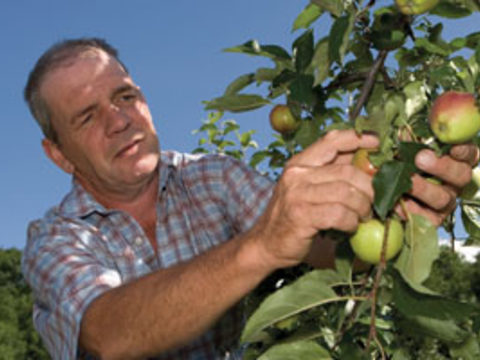Tracking pipfruit Black spot fungicide sensitivity
A commitment to product stewardship underpins the participation of Syngenta in a comprehensive Black spot sensitivity survey carried out by Plant and Food New Zealand on behalf of NZ Apples and Pears Incorporated (NZAPI) and other agrichemical suppliers.
The survey took place during the 2020-21 and 2021-22 growing seasons in pipfruit orchards across Hawke's Bay, Otago, Gisborne and Tasman.
Paul Hassan, Technical Services Lead for Syngenta, explains: “The survey’s goal was to carefully monitor Black spot populations for any shifts towards insensitivity against the products being tested, so resistance management strategies can be changed proactively to preserve the usefulness of these products into the future."
“The most powerful products in a typical Black spot fungicide programme are single site inhibitors. Over time, these are at risk to causing a loss of sensitivity in Black spot populations, potentially leading to a loss of field control.”
Regional samples were tested for their sensitivity to fungicides from four different Mode of Action groups, including the Syngenta pipfruit fungicides: SEGURIS® Flexi (Group 7), SCORE® WG (Group 3), TOPAS® (Group 3) and CHORUS® (Group 9).
Generally, the Black spot populations tested were found to be moderately or highly sensitive to the Syngenta products tested.
“It’s excellent to see our fungicides still working effectively to help growers control Black spot,” says Paul. “However, growers should be aware that resistance to cyprodinil (CHORUS®) in Tasman was confirmed and there tended to be lower sensitivity to penconazole (TOPAS®) than difenoconazole (SCORE® WG) in all regions."
“This is good news for growers who can continue to use these products with high confidence that they help control Black spot to a commercially acceptable standard.”
Paul says the results highlight growers’ efforts to maintain strict discipline in their Black spot management programmes by rotating Mode of Action groups and following label guidelines for product use.
“The results also show that the resistance management strategy that NZAPI and Plant and Food Research have devised for ‘at risk’ fungicides is working well."
“Across the pipfruit sector, our ongoing adherence to best practice resistance management rules are vital to ensure these fungicides stay available to protect crops from Black spot.”

